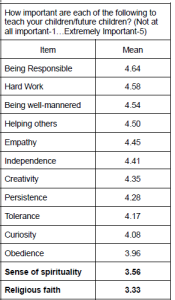Following are updates shared from submissions of the Lutheran Office for World Community and state public policy offices (sppos) in the ELCA Advocacy Network this month. Full list and map of sppos available.
UN | COLORADO | OHIO | PENNSYLVANIA | TEXAS | WISCONSIN
Lutheran Office for World Community, United Nations, New York, N.Y. – ELCA.org/lowc
Christine Mangale, Director
UN General Assembly Third Committee: The UN General Assembly Third Committee, which focuses on Social, Humanitarian and Cultural issues, meets Oct. 3 through Nov. 22. Recently, the LOWC Director hosted a small delegation in advance of their attending meetings from LWF Action for Justice and Witness in Society staff. These participants attended an event titled “Comics and Human Rights,” which featured Dr. Michael Fakhri, United Nations Special Rapporteur on the Right to Food, who presented his report “Starvation and the right to food, with an emphasis on the Palestinian people’s food sovereignty,” and worked with renowned artist Omar Khouri to produce the first UN human rights report that uses graphic reportage. It utilized the power of comics to convey communities’ horrors and hopes, focusing on the Palestinian struggle for liberation.
Many of the topics discussed in the Third Committee focus on the advancement of women, the rights of children, racism and self-determination, and the protection and promotion of human rights. LOWC has also connected with other ELCA teams by sharing notes from the meetings related to regional and thematic work, including from the Special Rapporteur on the Human Rights of Migrants and from the Special Envoy of Myanmar. LOWC will continue to connect ELCA and LWF to relevant meetings at the United Nations Headquarters to ensure that Lutheran voices are heard in these multilateral decision-making and review meetings.
Diakonia Overcoming Violence Exchange: From Oct. 14-19, the Hunger Advocacy Fellow placed with LOWC attended Diakonia Overcoming Violence Exchange (DOVE) organized, by Diakonia of the Americas and Caribbean (DOTAC), an ecumenical group of 12 diaconal communities/associations. The meeting focused on migration in the context of the United States/Mexico border. Participants lived in community for a week at La Posada Provincia, a shelter for migrants who have recently arrived in the United States.
Throughout the week, participants learned about the work done by ELCA AMMPARO, Texas Impact in the ELCA-affiliated state public policy office network, and Catholic Charities, and listened to presentations from U.S. Border Patrol and immigration attorneys. The group also physically crossed the United States/Mexico border between Brownsville and Matamoros. The experiential learning and relationship building strengthens advocacy accompaniment. Our LOWC Hunger Advocacy Fellow will continue to forge meaningful connections linking LWF migration policy conversations with AMPPARO and other Lutheran networks seeking migration justice.
LOWC Presence Shares Expertise and Advances Relationships: In the United States this year as coordinated through ELCA Ecumenical and Inter-Religious Relations, the LOWC Director with several Witness in Society D.C.-based staff hosted and resourced Branches of Peace in D.C. on Oct. 21 and intersected at other points in their Oct. 20-25 meeting. It is part of an initiative launched in 2022 by the Finnish Evangelical Lutheran Mission (FELM), bringing together peace and reconciliation theologians and practitioners from around the world to engage in peer-to-peer contextual learning. This year, participants from nine countries explored the role of advocacy and the importance of being a public church, as well as surveyed the rise of religious extremism and tribalism globally with a particular focus on the rise of religious extremism and tribalism globally.
At the annual Women’s Human Rights Advocacy Training in Geneva Oct. 14-18, the LOWC Program Director co-led the training of women and men gender champions to engage with UN Human Rights processes and built capacity of feminist communities of Christians that are tackling delineated challenges in their own communities.
When the bi-annual Sexual Violence Research Initiative (SVRI) conference took place in Cape Town, South Africa on Oct. 21-25, the LOWC Program Director took part. LWF and LOWC co-facilitated several events, and shared evidence from our programs. Work of Faith-Based Organizations (FBOs) is moving to evidence-based models, and the conference built the capacity of our advocacy staff to learn to better engage in research spaces and to build networks with researchers investigating violence against women and girls around the world. A delegation hosted by LOWC from Lutheran churches and country programs in Jamaica, Hong Kong, South Africa, Switzerland and Uganda in addition to the United States also took part.
Presence at these events reflects common priorities between ELCA and LWF members and partners. Accompaniment is defined as walking together in a solidarity that practices interdependence and mutuality. The ELCA lives out accompaniment in relationships with global companions, striving to share God’s love and participate in God’s mission together.
The United States is up for review in the Universal Periodic Review (UPR), a UN human rights process along with Convention on the Elimination of All Forms of Discrimination against Women (CEDAW), and the ELCA is participating in an ecumenical exercise to draft a common faith-based shadow report. ELCA staff and members that have attended the Women’s Human Rights Advocacy Training will be contacted to make contributions. Our advocacy will include urging the U.S. Congress to push for ratification of the CEDAW and other UN human rights conventions rather than be absent in these spaces.
A November report-back webinar is shaping with participants in the Sexual Violence Research Initiative (SVRI) during the 16 Days of Activism Against Gender-Based Violence campaign observed Nov. 25-Dec. 10.
Lutheran Advocacy Ministry Colorado – lam-co.org
Peter Severson, Director
ELECTION RESULTS: Coloradans voted on 14 statewide ballot measures on Election Day. We were pleased to see the passage of three measures we supported:
• YES on Prop JJ: Colorado will keep the revenue it’s collected from sports betting to support water infrastructure and projects.
• YES on Amendment I: The bail exemption for persons arrested on suspicion of first-degree murder with evident proof and/or a greater degree of presumption is restored.
• YES on Amendment J: Old language banning same-sex marriage was removed from Colorado’s constitution.
We were advocating for the defeat of Prop 128 as well, but that measure passed. It will extend the length of time some offenders must be incarcerated before being eligible for parole while removing incentives like earned time for good behavior. It’s overly punitive, expensive, and offers no net public safety benefit.

Peter Severson
Director, Lutheran Advocacy Ministry Colorado
GOODBYE AND FAREWELL: Peter Severson, the director of Lutheran Advocacy Ministry Colorado (LAM-CO) for over 10 years, will end his service as director on November 30. In his own words: “I am grateful for the opportunity to lead this organization for such a long and eventful term, I appreciate my excellent colleagues in this work, and I am very proud of all we’ve accomplished with our faithful advocacy over the years. Advocacy is central to our baptismal covenant and is a critical witness of our church. I pray that our God of love and grace will continue to lift up all those who lead and support this work moving forward. Peace be with you.
Hunger Network in Ohio – hungernetohio.com
Deacon Nick Bates, Director
On Nov. 10, Hunger Network in Ohio (HNO) hosted our second annual celebration. After the defeat of our redistricting amendment and other shortcomings at the ballot box across Ohio, many weren’t in the mood for a celebration. But we gathered to remind ourselves that the struggle for justice in our world is a constant struggle and we celebrate our community and hope in Christ.
During our time together we celebrated the great work of Kim Collum of Lutheran Community Services in Bellefontaine and Catherine Turcer of Common Cause Ohio for their faithful service to their communities.
We also heard from movement expert James Hayes (Ohio Voice) and policy expert Sarah Hudacek (Advocates for Ohio’s Future) about what is coming in Ohio and opportunities to end hunger.
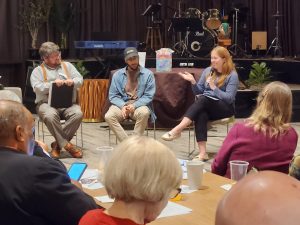
James Hayes of Ohio Voice and Sarah Hudacek of Advocates for Ohio’s Future
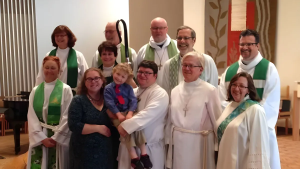
Nick Bates, Hunger Network Ohio
CONGRATULATIONS!
HNO is also pleased to celebrate the 10-year ordination anniversary of our director, Deacon Nick Bates who was ordained in November 2014 in Columbus, Ohio. If you would like to send congratulations to Deacon Bates for 10 years of word and service ministry, CLICK HERE.
Lutheran Advocacy Ministry – Pennsylvania – lutheranadvocacypa.org
Tracey DePasquale, Director
In November, Lutheran Advocacy Ministry Pennsylvania (LAMPa) continued its work of recruiting poll workers and equipping Lutherans participating in an interfaith election protection network. For many Lutherans this month, discipleship took the form of civic engagement as nonpartisan observers of their county’s official post-election ballot count. For others, it was showing up as a nonpartisan, non-anxious presence at polls– helping to lower stress and reporting and responding to (thankfully limited) acts of violence.
 LAMPa used a grant from Interfaith America to seed more Love Anyway Feasts – including one at Van Kirk Lutheran Church in Beaver County, Pennsylvania. The church shares a parking lot with the local fire department which acted as a polling place on election day.
LAMPa used a grant from Interfaith America to seed more Love Anyway Feasts – including one at Van Kirk Lutheran Church in Beaver County, Pennsylvania. The church shares a parking lot with the local fire department which acted as a polling place on election day.
“This made Van Kirk an ideal location to host a Love Anyway Feast but in a unique way,” said Vicar Amy Kelly. “The church set up a fancy coffee bar and treats station outside the church to serve, connect, and unite the community until the polls closed. This space allowed people to talk about what they were passionate about – like dogs, health, and education, and they knew they would be heard and not demeaned for their opinions. It was a beautiful experience to watch people from all parts of the political spectrum be in community with each other. We left feeling hopeful that after such a divisive political season, we could come together and remember that we are all made in the image of God.”
Texas Impact – texasimpact.org
Scott Atnip, Director of Public Witness
Texas Impact is coordinating a Houston Faith Votes cohort to engage in civic engagement work to demonstrate the impact congregations can have in engaging voters. The 22 congregations engaged in civic engagement and data collection work to evaluate their impact post elections. Those fifteen are joining with many other congregations using Texas Faith Votes resources.
Post-election, many congregations are asking what they can do. An increasing number are signing up to participate in Texas Impact’s Courts and Ports program, traveling to the Texas-Mexico Border to experience public policy issues being lived out on the border.
Members of Texas Impact’s Public School Defenders team organized to provide testimony and meet with State Board of Education Members as they consider a new school curriculum that heavily references religion and uses religious stories as part of the reading and language arts curriculum.
Texas Impact staff in October are preparing to attend the Conference of the Parties (COP) climate negotiations with ELCA colleagues in Baku, Azerbaijan in November.
Post-election planning is now underway as staff prepares for the biennial legislative session to convene in January.
Lutheran Office for Public Policy – Wisconsin – loppw.org
Rev. Cindy Crane, Director
Wednesday Noon Live
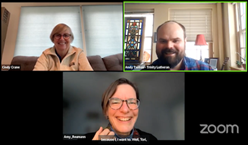
The Rev. Amy Reumann
Senior Director, Witness in Society
Interview with Rev. Amy Reumann, Senior Director of ELCA, Witness in Society (WiS)
Amy shared her experience with Lutherans’ involvement in this election cycle and thoughts about some of the challenges we face.
Additional Efforts Post-election: Lutheran Office for Public Policy Wisconsin (LOPPW) sent out a special email addressing the elections. The director also preached with a focus on the election at Our Savior’s Lutheran Church in Solon Springs.
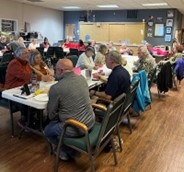 The Farm Bill
The Farm Bill
LOPPW was invited to be one of the speakers at the Community Food Conversations’ gathering at Lutheran Church of the Great Spirit, organized by Greater Milwaukee Synod (GMS) hunger leaders. Rev. Crane discussed advocacy and the Farm Bill. Several people signed a letter to Congress. LOPPW also addressed the Farm Bill at Hope Lutheran Church in River Falls and online.
Training on Money in Politics
Two synods included LOPPW in their resolutions about money in politics during their 2024 assemblies. In response, LOPPW’s director met with representatives from the East-Central Synod of Wisconsin (ECSW) and GMS to discuss next steps. Everyone agreed to organizing a training for trainers. LOPPW contacted Wisconsin United to Amend, also mentioned in the resolutions. We now have a power point, created by Wisconsin United to Amend with faith-based components from LOPPW and a handful of people who have signed up for the training on Nov. 22 via Zoom.
LOPPW received many invitations for presentations in October and November. I will now focus more on completing succession planning for this ministry that I have been so blessed to steward.
 It’s interesting that, rather than a stadium full of adoring fans, God arrives among us through a backwater town. Born into a feeding trough, there was no live stream to witness Christ’s arrival. Especially because Jesus is God’s victory for all people.
It’s interesting that, rather than a stadium full of adoring fans, God arrives among us through a backwater town. Born into a feeding trough, there was no live stream to witness Christ’s arrival. Especially because Jesus is God’s victory for all people.



















